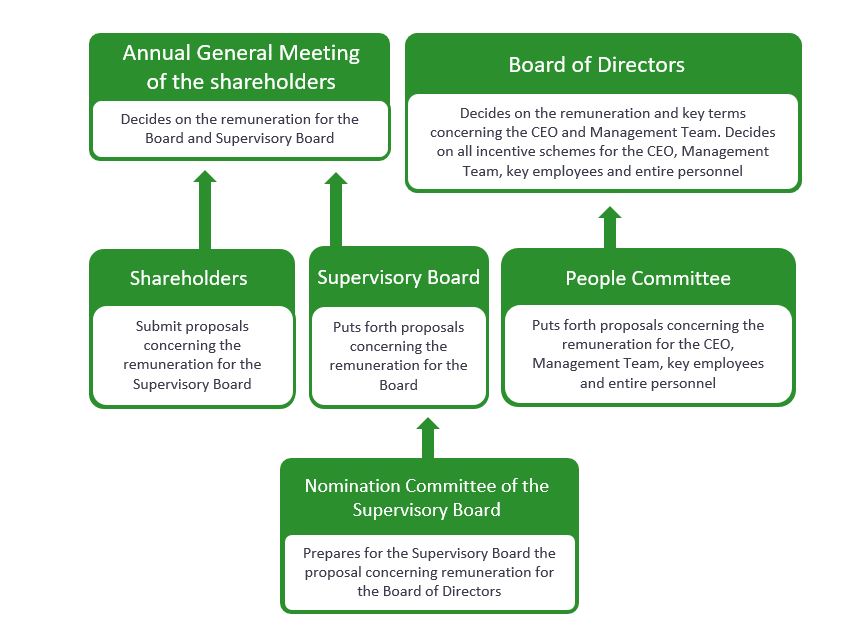The Board’s People Committee prepares matters concerning the salaries and other financial benefits of the other management (Management Team; name until June 2024 Executive Committee) and the Board decides on these matters.
The remuneration for the members of the Management Team is comprised of a fixed basic salary, fringe benefits, the short-term (STI) and long-term (LTI) incentives.
The pension of the members of the Management Team is determined according to the Finnish employment pension scheme TyEl; the members are covered by the group pension insurance scheme of the Raisio Group Management. A sum equivalent to 15 per cent of the manager’s basic annual salary (salary in money and taxation value of fringe benefits such as possible car benefit) is paid into the group pension insurance every year. As of 2020 the retirement age for members of the Management Team is in accordance with the current legislation. For those Management Team members, who have been appointed before 2020, the retirement age is 62 years.
For the Management Team, the incentive scheme is based on the achievement of EBIT and net sales targets; the criterion is either the Group’s EBIT or Division’s EBIT and net sales. The Management Team member’s annual bonus is not more than 50% of the annual remuneration. The achievement of bonus targets in the schemes of other executives is assessed after the financial year has completely ended, and a possible bonus is paid in cash by the end of March of the year following the financial year.
The earnings period of each share incentive scheme (LTI) is three years and the potential bonus is based on the company’s Total Shareholder Return (TSR). Bonus payment is dependent on the achievement of the Group’s cumulative profit target (EBT, earnings before taxes) during the earning period.
The Management Team members’ notice period is in conformity with the Employment Contracts Act, but always at least three months for both the company and manager. If the company terminates the contract, manager is entitled to compensation corresponding to six or nine months’ pay, in addition to the pay for the notice period.
The information on the remuneration of the Management Team members is provided on an aggregated level, as required by the Finnish Corporate Governance Code, i.e. the amounts of personal benefits are not reported.
Summary of remuneration of Management Team members (excl. CEO)
|
2023 (EUR)
|
2024 (EUR)
|
Fixed basic salary
|
1,110,303
|
1,133,495
|
Fringe benefits (car, mobile phone)
|
42,563
|
45,761
|
Pension
|
174,035
|
169,242
|
Fixed salaries in total
|
1,326,901
|
1,348,498
|
Short term incentive scheme (STI)
|
|
|
Earning period 2022
|
74,774
|
–
|
Earning period 2023
|
–
|
50,979
|
Long term incentive scheme (LTI) and € *
|
|
|
Earning period 2021–2023
|
–
|
|
Earning period 2022–2024
|
|
–
|
Total varying remuneration
|
0
|
0
|
Total remuneration
|
1,401,675
|
1,399,477
|
*The cash payment is intended to cover the transfer tax arising from the share reward.

